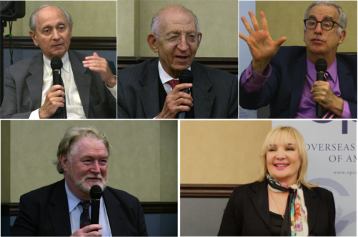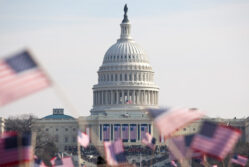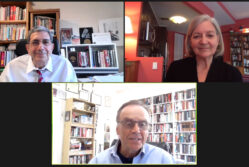Event Coverage Highlight

Experts Look Ahead as New UN Leader Takes Helm

Clockwise from upper left: Stephen Schlesinger, Abdelkader Abbadi, Richard Roth, Linda Fasulo and Ian Williams. Photo: Chad Bouchard
By Chad Bouchard
Just as coverage of the US presidential election reaches fever pitch, the United Nations is bracing for its own transition as the General Assembly considers Portugal’s former prime minister, António Guterres, to replace Ban Ki-moon as Secretary General.
On Oct. 4, on the eve of a key straw poll among Security Council members, the OPC hosted a discussion about the UN’s current role in tempering global conflicts and crises.
Stephen Schlesinger, a historian and author, said the UN has to overcome public perception that the body is ineffective in its founding mission to end global conflicts.
“This casual dismissal of the UN’s efforts to settle disputes,” he said, “which we hear so often, particularly in the United States, is very short sighted.”
Schlesinger acknowledged that the international body suffers shortcomings, but cautioned critics not to overlook successful UN-fostered settlements such as those in Cambodia, Guatemala, El Salvador, Mozambique, Sierra Leone, Burundi, Namibia and Liberia.
Abdelkader Abbadi, UN correspondent and former director of the UN’s Department of Political Affairs, was less generous.
“[The UN’s] structures are old, its finances inadequate. It needs dynamic and visionary leadership. Those means are necessary for the organization to be able to face the issues of our turbulent world,” he said.
“We delay because of lack of consensus among negotiators, and also because of lack of readiness to compromise. It’s easier to adopt declarations than plans of actions which require financial resources.”
He added that the UN’s budget for peacekeeping is $8 billion, while only $1 million is allocated for preventative diplomacy.
Ian Williams, UN correspondent for The Nation, agreed that the UN struggles to establish legitimacy, with most Americans “sneeringly dismissive” of its role in global developments.
“And part of that problem is the behavior of the permanent five. The U.S. and Russia are both prone to invoke the UN when it suits them, and to ignore it when it doesn’t,” he said.
He added that journalists in both countries are too partisan, and fail to hold leaders accountable when they violate international treaties, such as recent movements in the U.S. and U.K. to increase nuclear arms.
Richard Roth, CNN’s veteran UN Correspondent, said the UN needs to improve public relations and to make itself more relevant.
He said under Secretary General Ban Ki-moon, the UN has “disappeared in the public eye,” with too much focus on global symposiums, meetings and conventions.
“Ban Ki-moon in my opinion has to have been the most traveled Secretary General – do you want someone like that to be like a town mayor, giving speeches, appearing in a panel, a conference? I would put that person in New York with a laser focus, walking around the building asking ‘what do you do?’”
The panel was moderated by OPC member Linda Fasulo, a veteran independent correspondent for NPR News at the UN.



